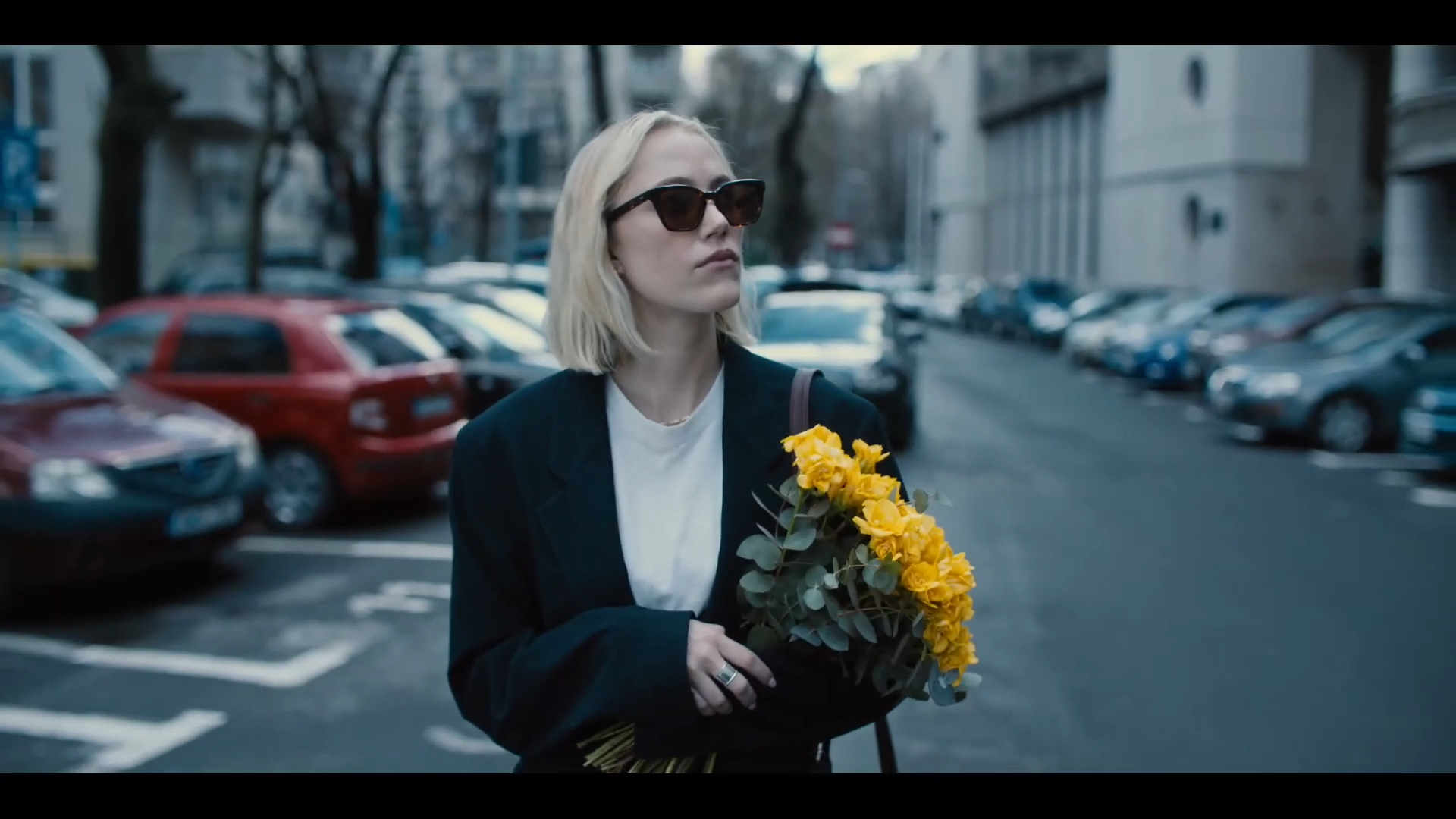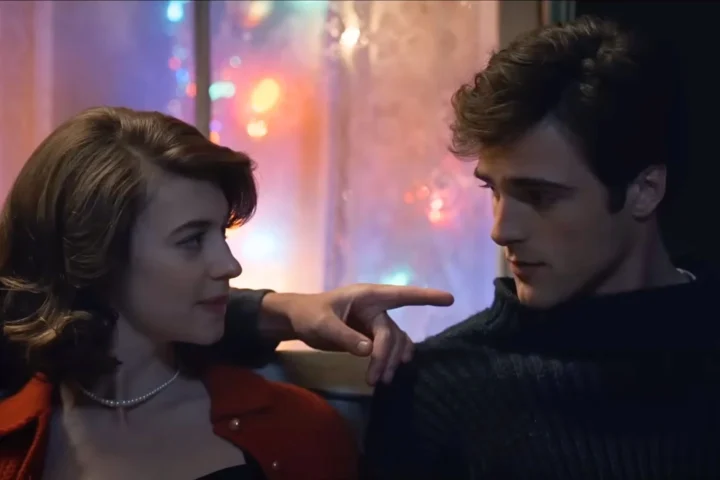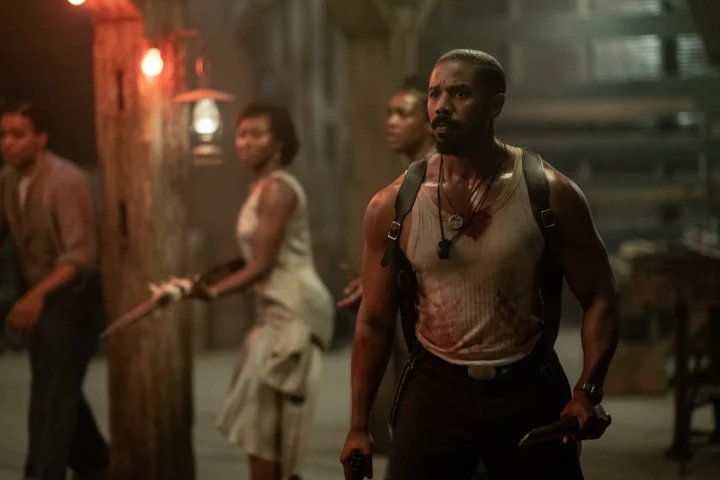An exceedingly sleek and scary hat tip to Hitchcock and Polanski, Watcher deals some terrifying cards—voyeurism, stalking, murder—and ratchets up tension in a taut, elegant exercise in paranoia. An impressive debut written and directed by Chloe Okuno, Watcher echoes classic suspense pictures while sidestepping genre trappings, keeping us guessing right to its diabolical denouement. It also has something on its mind about a how a woman’s concern for her safety is met with disregard and gaslighting by a series of ineffectual men.
A committed Maika Monroe stars as a former American actress and newlywed whose husband relocates the pair to Bucharest after a career-making promotion. Francis (Karl Glusman) is half-Romanian and speaks the language, but Julia (Monroe) feels immediate disorientation as an American hampered by cultural barriers, largely alone in an unfamiliar city.
By day she roams Bucharest’s byways, but spends nights by herself in their sprawling apartment, with its huge and revealing windows. Directly across the street lies another apartment building in which a mysterious, shadowy figure appears from his own window, immediately fixated on the pretty blonde expat across the way.
This mutual voyeurism continues nightly, the watcher’s gaze undeterred and Julia increasingly anxious. But the stakes are raised when Julia ventures around the city—to a coffee shop, grocery store or to catch a revival matinee of Stanley Donen’s Charade in a local cinema—and becomes convinced that her nightly watcher has now become her daily stalker. Complicating matters is the revelation of a serial killer named the Spyder, on the loose and gruesomely decapitating neighborhood women. Could they be the same man?
In a lesser film such a set-up would be (and has been many times) the driver of exploitation or titillation, but Okuno instead focuses on the notion of a woman under a microscope, certain she is the object of an unwanted invasion of privacy and increasingly afraid for her safety yet unable to find any respite from the watcher’s fixed, nightly stares.
Julia relays her fears to Francis, shows him a convenience store security video of the man’s proximity, who summons a local cop (Florian Ghimpu), but after investigating both men are quick to diminish her concerns by suggesting that she may actually be the watcher, suffering from an overactive imagination. And then the watcher himself (Burn Gorman) shows up, asserting that he is actually her object of fascination. This unmistakable thematic current about a woman dismissed by gaslighting men says more about contemporary male-female dynamics than all of Alex Garland’s recent, absurd parable Men. One wonders if male and female viewers might observe the picture’s heroine, and her actions, through different lenses.
Yet this idea–just who is watching whom?–gives us, and Julia, pause. As her marriage drifts, tensions increase and isolation becomes a sort of prison (shades of Repulsion), even Julia questions if she’s erred in her suspicions. We begin to wonder if Francis can be trusted. Her only support comes from ebullient, libertine neighbor Irina (Madalina Anea), whom Julia will later discover in an underground, red light strip club, exotic dancing in a tight, glass box for the salivating male gaze.
Okuno’s slow burn picture is a marvel of visual invention deploying geography as character. Bucharest as depicted here is darkly sinister milieu where terror lurks in broad daylight, a hermetically sealed place of foreboding for anyone unable to speak the language. I’ve been to Bucharest twice in the last several years and Okuno has taken a bit of creative license for suspense—the city I know is muscular, on the move and one in which nearly everyone speaks English with great accommodation in welcoming Westerners. It is an city of contrasts blending the elegant decay of a half-century of communism (which ended in 1989) with a progressive, contemporary polish, a striking juxtaposition found in its Old City environs and across its sprawling urban expanse.
Technical specs craft a visual and aural vortex of unease from the overscaled apartment with inescapable windows to the unnerving sound drift between the very thin walls of adjacent apartments which detect bumps in the night, both erotic and deadly, and in one tense moment, a ringing cell phone, barely audible. If that moment doesn’t raise the hairs on the back of your neck, certainly nothing will.
Okuno keeps a tight coil on her screenplay, based on a script by Zach Ford, but in the final moments Watcher delivers a significant punch, beginning with an accidental, menacing subway encounter as chilling as anything the movies have produced in an age, and a Grand Guignol climax the picture earns with its slow-and-steady-wins-the-race revelations, where any and all ambiguities are put to rest and the suggested is finally made explicit. It’s a humdinger of a finale.
Watcher takes its time but is consistently absorbing in Monroe’s introspective, inquisitive consideration of her dilemma as a woman who knows danger is close yet is unable to stop its intrusion on her psyche or person. While a cursory description of the picture may suggest elements of Rear Window‘s tenebrous mystery, Rosemary’s Baby‘s secret cabal, The Tenant‘s psychological dread or even Apartment Zero‘s uncomfortably eccentric denizens, it has a feminist perspective all its own and a trust in the audience to unravel and interpret its events, along with its heroine, right to its final, terrifying elucidation.
Watcher is an intelligent nerve-shredder and one of the year’s great moviegoing experiences.
4 stars.




Yeah, this movie is absolutely terrific. Took me by surprise, as the plot read like slasher boilerplate. I wouldn’t say it sidesteps genre trappings as much as it subverts them. It plays almost like an understated take on giallo until we finally meet “the watcher.” Beautifully filmed. Really captures the loneliness of being a stranger in a strange land. Can’t wait to see her next project.